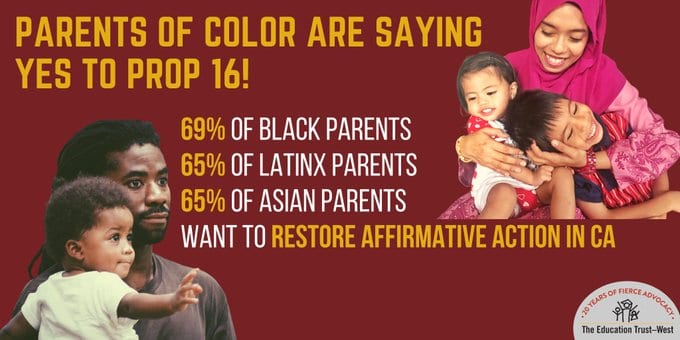What Proposition 16 Means for Higher Education in California
Voters are heading to the polls in droves, not only to elect the next president, but in California, to decide on Proposition 16. This would remove the ban on affirmative…

Voters are heading to the polls in droves, not only to elect the next president, but in California, to decide on Proposition 16. This would remove the ban on affirmative action policies in higher education in the state and reverse years of inequity in access to quality public higher education. The ballot measure would repeal Proposition 209, a 1996 referendum prohibiting the consideration of race, gender, and ethnicity in public education, workforce and contracting, which delivered the inequities continue to exist in California.
The debate on affirmative action policies is not new, especially to California. In fact, the first Supreme Court battle over affirmative action occurred in 1978 with Regents of the University of California v. Bakke. The Court declared quotas as an affirmative action strategy unconstitutional—permanently ending the use of quotas in higher education admissions across the United States. Two decades later, the Board of Regents introduced a ban on the use of affirmative action in admissions to the University of California. The ban was integrated in the state constitution, following the passage of Proposition 209. This resulted in decreased access and maintained inequitable representation for Black and Latino students in California in what was regarded as one of the best university systems in the world. Eventually, seven other states adopted their own bans on affirmative action. Recently, the UC Board of Regents acknowledged the harmful policy and voted to support a repeal of the ban. Now, it’s up to California voters.
The consequences of past racist education policies are evidenced in degree attainment rates of Black and Latino citizens. For Black Californians, 34% of adults have a college degree. The reality is much harsher for Latinos in California, who make up 36% of the state’s total population, yet only 18% of Latino adults have a college degree. Both communities have been locked out of fully participating in the state’s economy, all while comprising the fastest and largest growing ethnic group and home to the fifth largest Black population in the country. Boosting degree production for students of color will require more from all three public systems of higher education in California, and Prop 16 will offer a first step to supporting the institutions in doing so.
The ban on affirmative action has seeped into the policies, practices, and programming of each higher education system. For the nearly 25 years, state and institutional leaders have invested in race-blind approaches to support college access and success, so as to not violate the law. The ban had a “chilling effect” on community colleges and ended their race-conscious and culturally relevant programs. As a result, equity gaps in transfer and degree completion remain. Four-year transfer rates of Black (9%) and Latino (10%) community college students are much lower than those of their Asian (24%) and White (17%) peers. Not surprisingly, the same patterns exist in graduation rates at all three systems, underscoring the failure of race-neutral strategies—-such as those focused on income disparities — in eliminating racial equity gaps.
While the affirmative action fight is engulfed by a fixation on admissions into the UC system, the vast majority of students attend the state’s other two public postsecondary systems, which have also been affected by the ban. The 116 California Community Colleges (CCC) comprise the largest higher education system in the world, serving more than 2.1 million students. Additionally, the 23 California State Universities (CSU) enroll over 400,000 undergraduates and make up the nation’s largest public four-year university system.
If Prop 16 passes, then California gains the ability to address racism more intentionally. Higher education could be transformed by doing the following:
Prop 16 will greenlight the opportunities to implement and scale the gender and race-conscious support services necessary to close opportunity gaps at all three of the state’s colleges and universities. Institutions of higher education can end or reproduce systemic racism. Californians will have the choice to decide what function its higher education systems will take — you can support changing the course of history by volunteering with the Yes on 16 campaign today. If you live elsewhere in the U.S., support the push for race-conscious policies in your state — because higher education can be a lever to fix racism.